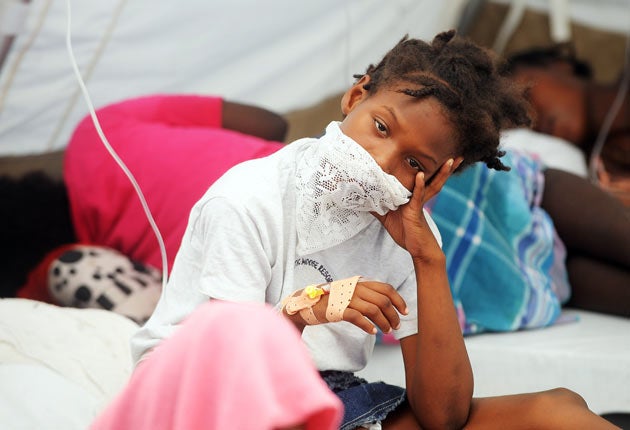Your support helps us to tell the story
From reproductive rights to climate change to Big Tech, The Independent is on the ground when the story is developing. Whether it's investigating the financials of Elon Musk's pro-Trump PAC or producing our latest documentary, 'The A Word', which shines a light on the American women fighting for reproductive rights, we know how important it is to parse out the facts from the messaging.
At such a critical moment in US history, we need reporters on the ground. Your donation allows us to keep sending journalists to speak to both sides of the story.
The Independent is trusted by Americans across the entire political spectrum. And unlike many other quality news outlets, we choose not to lock Americans out of our reporting and analysis with paywalls. We believe quality journalism should be available to everyone, paid for by those who can afford it.
Your support makes all the difference.Five thousand dead, 300,000 ill, and a medical emergency that has already lasted six months; now the people of Haiti have someone to blame for the cholera outbreak which has swept through their earthquake-ravaged country: the blue-helmeted peacekeepers of the United Nations.
An official report into the ongoing epidemic, which began last October, has concluded that it was almost certainly caused by a poorly constructed sanitation system installed at a rural camp used by several hundred UN troops from Nepal.
The virulent strain of cholera bacteria began infecting locals after faecal matter from their base seeped from badly designed septic pits into the Meye River, a tributary of the Artibonite River in the country's central region.
The river system is used by tens of thousands of mostly rural Haitians to provide water for drinking, cooking, bathing and washing clothes. When large numbers began falling ill, hospitals were quickly overwhelmed. It was then only a matter of time before the outbreak spread to major cities.
The findings will only add to tension between peacekeepers and the citizens of a country which is still barely starting to recover from the worst natural disaster in modern history. The earthquake in January last year left between 200,000 and 300,000 people dead, and 1.5 million homeless.
The UN's glacial response to the initial disaster, and the slow progress of reconstruction efforts – about 750,000 Haitians still live in "temporary" refugee camps – has been a cause of complaint in the capital, Port-au-Prince. With the rainy season approaching, health experts fear cholera could add to their woes by infecting a further 500,000 people.
That would represent a major public relations disaster for the UN mission. Since October, many locals have blamed Nepalese peacekeepers for introducing cholera to their country. Before Christmas, and again last week, the issue sparked protests, with reports of crowds throwing rocks at UN staff.
The report into the cholera outbreak, which was compiled by a four-person panel of medical experts and released on Wednesday night, justifies many of their complaints. It concluded that the cholera in Haiti originated in Asia, as many locals suspected, and matches strains found in Nepal in 2009.
Although the panel then dismisses as a mere "hypothesis" suggestions that Nepalese troops brought the bacteria into the country (which had been cholera-free for decades), it concedes that the disease began infecting large numbers of Haitians only when it entered the water supply via their camp's dysfunctional septic disposal system.
"The sanitation conditions at the Mirebalais Minustah camp were not sufficient to prevent faecal contamination of the Meye Tributary System of the Artibonite River with human faecal waste," the report states. "There is no fence around the site, and children were observed playing and animals roaming in the area around the pit."
From there, the contaminated river was then the "likely route of the spread of Vibrio cholerae from the mountains of Mirabalais to the coastal areas around the Artibonite River Delta," leading to an "explosive cholera outbreak eventually throughout Haiti".
In conclusions that are unlikely to dampen local anger, the report cites a "confluence of circumstances," many beyond the UN's control, for contributing to the subsequent death toll.
The Artibonite River and its surrounding canal system provided "optimal conditions" for the bacteria to spread, it reads. Many Haitians ignored basic hygiene rules, and lacked immunity to cholera. And hospitals in the region were quickly overwhelmed.
"The introduction of this cholera strain as a result of environmental contamination with faeces could not have been the source of such an outbreak without simultaneous water and sanitation and health care system deficiencies," concludes the report.
Haiti's new President, Michel Martelly, has yet to respond to the UN findings. Clifford Baron, the owner of Sanco Enterprises, the company contracted by the UN to dispose of waste at the Mirebalais camp, refused to comment.
The UN Secretary General, Ban Ki-moon, said, he would "convene a task force" within the UN to "study the findings and recommendations".

Join our commenting forum
Join thought-provoking conversations, follow other Independent readers and see their replies
Comments